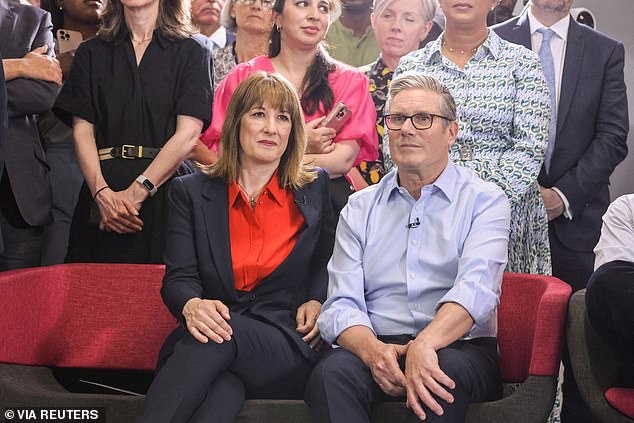- Economist warns tax rises in November are now looking ‘inevitable’
Long-term Government borrowing costs continued to swell on Friday after official data showed UK borrowing smashed official forecasts last month.
It follows pressure on long-term gilt yields – the interest paid on Government debt – on Thursday after Bank of England Governor Andrew Bailey appeared to play down the prospects of further interest rate cuts.
The yield on 30-year gilts jumped by as much as 5 basis points in early trading as the Office for National Statistics said net borrowing came in at £18billion in August.
This was £3.5billion more than in August last year, well ahead of market expectations of £12.8billion and £5.5billion higher than forecast by the Office for Budget Responsibility in March.
Soaring interest on Government debt – up £1.9billion to £8.4billion – made a significant difference, reflecting the fact long-term gilt yields have soared over the last year.
Making matters worse, 10- and 30-year yields – which move inversely to the price of the bond – were up by 2bps each at 4.7 and 5.53 per cent, respectively, by midmorning.

‘Tax rises in November look inevitable,’ economist warns
Ten-year and 30-year yields are up by 107bps and 80bps respectively over the last year as investors have sold off Government debt in response to fiscal concerns.
They have eased slightly over the last month, however, as it became clear the BoE would slow the pace of its quantitative tightening programme.
The Government also spent more on benefits and public services last month, offsetting a boot from increased employer national insurance contributions.
Martin Beck, chief economist at WPI Strategy, said the figures ‘underscore the Chancellor’s growing fiscal headaches ahead of November’s Budget’, which is now likely to be even more painful.
He said: ‘At the current pace, borrowing in 2025-26 could overshoot the OBR’s full-year forecast by nearly £20billion, pushing the deficit close to 5 per cent of GDP
‘Informed speculation also suggests the OBR will strike a more pessimistic tine on productivity, another reason why talk of a fiscal ‘black hole’ is not misplaced.
‘That means tax rises in November look inevitable. The choice of which taxes to raise will be critical.
‘Levies that fall on businesses and are passed through to consumers, as with last April’s hike in employer NICs, risk stoking inflation and undermining growth.
‘By contrast, there is scope for revenue-raising reforms that would make the tax system more efficient. But these come with political risks that a government, faced with faced with fractious backbenchers and shaky support, may be reluctant to take.’

DIY INVESTING PLATFORMS

AJ Bell

AJ Bell
Easy investing and ready-made portfolios

Hargreaves Lansdown

Hargreaves Lansdown
Free fund dealing and investment ideas

interactive investor

interactive investor
Flat-fee investing from £4.99 per month

InvestEngine

InvestEngine
Account and trading fee-free ETF investing
Trading 212
Trading 212
Free share dealing and no account fee
Affiliate links: If you take out a product This is Money may earn a commission. These deals are chosen by our editorial team, as we think they are worth highlighting. This does not affect our editorial independence.
This article was originally published by a www.dailymail.co.uk . Read the Original article here. .

